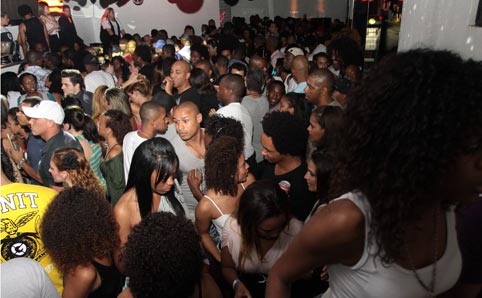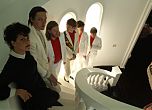
The ladies have their hair styled in various ways, from teeny-bopper Afro puffs and ‘80s banana-clipped upsweeps to waist-length Indian braids; and from Erykah Badu-style head wraps to voluminous and lushly-moisturised Afros – called, free of all irony, black power here in Brazil. They all dance, first individually, bobbing and weaving to the music, and then in unison, as one of the girls starts a series of intricate steps and turns that the others pick up on and follow. Other partiers catch on and soon there are ten or 12 people turning and bouncing in a soulful, synchronous line dance reminiscent of the Electric Slide – one nation under a groove. Jay-Z’s groove, to be precise.
Thursday night at Club Glória, a reformed church with a basement-party feel, is ‘black music’ night, when a noticeably diverse crowd of twentysomethings pack into the sanctuary-turned-dancefloor and jam to hip-hop, R&B, dancehall and funk. Collectively dubbed música black, as it’s known in Brazil, the genre typically encompasses American hip hop and soul while excluding cultural cousins such as samba and local derivatives like funk carioca – a raunchy, percussion-heavy style of rap based on ‘80s and ‘90s Miami bass music (think 2Live Crew). With hip hop being one of the most popular genres on the planet, it’s no surprise that a club like Glória pulls in both moneyed university kids and B-boys from the periphery in a crowd that encompasses the full range of skin tones and ethnicities for which Brazil is known – though going purely by its fashion and TV industries, you might struggle to believe it.
Separate and not quite equal
The surprising thing is how singular Glória – a casual, jeans-and-trainers type of place – is in unifying this disparate crowd. In spite of claims to the contrary, São Paulo’s black music scene is as much a study in Brazil’s racial divisions as it is of its economic strata. Lions, an elaborately decorated establishment in the centre with its own Thursday night party called ‘Groovelicious’, attracts the moneyed, mostly-white elite with a high, exclusionary cover charge for ‘unaffiliated’ partiers, and a reputation for housey, electronica-infused sets. On the other hand, Friday night’s crowd at Joy Club in Pinheiros brims with glossy revellers right out of Ebony magazine: heavy on the coffee, chocolate and caramel.
‘The scene is very segregated,’ says hip-hop dancer Daniel da Silva Santos, 22, from Osasco, a far-flung suburb to the west of the city. As a dancer, Santos also frequents Clash Club in Barra Funda, whose Tuesday night ‘Chocolate’ party brings out the poppers-and-lockers. But, he says, the city’s realest black music aficionados head to the centre. ‘The underground parties downtown are where you find less commercial music, and the crowd tends to be mostly black.’
At events with curiously spelt names like ‘Blackallicyous,’ held on Wednesdays at the Hotel Cambridge in the centre, or the monthly – and free – ‘Funky Train’ soul party at Ação Educativa, middle- and working-class paulistanos escape their daily struggles for a bit by embracing music born of similar socio-economic circumstances north of the equator. ‘It takes me an hour to get downtown on the bus,’ says Santos, who one day hopes to revel at Joy. ‘But that’s where the party is.’
- Thursday night is black music night at Club Glória.
- Friday night is black music night at Joy Club.
- Blackallicyous is on Wednesdays at the Hotel Cambridge, Rua João Adolfo 126, Centro (3101 2537, www.noitesdocentro.com.br).
- The Funky Train soul party is monthly at Ação Educativa, Rua General Jardim 660, Santa Cecília (3151 2333).



